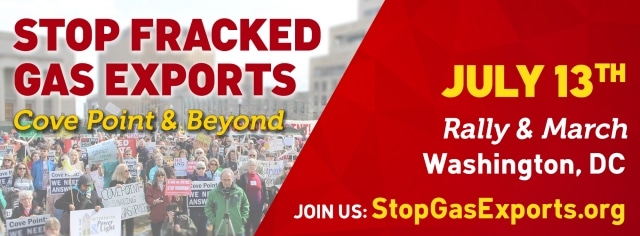Gas export terminals might be the new oil pipelines. Taking a leaf out of Keystone XL protestors’ playbooks, organizers have scheduled a Washington, D.C. rally to “Stop Fracked Gas Exports” on Sunday, July 13. Based on RSVP numbers, thousands are expected to attend.
The rally comes as the fight against liquefied natural gas (LNG) exports heats up around the U.S.
According to Ted Glick, national campaign coordinator of the Chesapeake Climate Action Network (CCAN), “There are 14 proposals before [the Federal Energy Regulatory Commission (FERC)] to build gas export terminals around the U.S. coastlines.”
Cove Point, which CCAN has been organizing against for over a year, “really could be approved at any point from a month from now on,” he said.
Glick’s comments came during a Climate Reality Check Coalition conference call about the July 13 rally. Also on the call were Sandra Steingraber, a biologist, author, and member of New Yorkers Against Fracking: Tyson Slocum, Director of the Public Citizen Energy Program: Keith Schue, an engineer from New York, and Linda Morin, a member of Calvert Citizens for a Healthy Community.
Though all of the speakers addressed the greenhouse gas emission problems with natural gas extraction and LNG exports, they mostly focused on policy, law, and immediate health and safety concerns associated with LNG transport.
Steingraber said there is “no sense of where LNG falls on the scale of villainy compared to other fossil fuels,” Steingraber said. Needless to say, proponents of LNG exports disagree with the “villainy” characterization, with many citing potential economic benefits.
Slocum contested LNG export proponents’ economic claims. The big companies involved in fracking, he said, “are not happy with what they see as artificially depressed prices for their natural gas.” By globalizing the market and increasing demand for LNG, natural gas companies will potentially gain “higher rates of return for fracking in the United States.”
“It’s very important for people to understand that the LNG push is all about helping domestic producers,” he said.
Along with the office of Senator Ed Markey, Public Citizen will be investigating the legality of natural gas exports. Slocum said the 1975 Energy Policy and Conservation Act potentially bans the exportation of natural gas.
Meanwhile, said Shue, the Department of Energy (DOE) has announced a policy change to the process by which LNG terminals are approved.
Previously, the DOE gave conditional approval to facilities before FERC went through environmental assessment and review process.
Under the proposed policy, the DOE will only decide whether LNG export projects are in the national interest after a final environmental review.
The new process will likely benefit companies who already have strong financial backing. The FERC process costs about $100 million, while the DOE export application costs about $20,000.
However, health and safety concerns are top of mind for those living near the sites of proposed LNG export facilities. It’s certainly what seems to be motivating many of the activists traveling from Calvert County, Maryland to Sunday’s protest.
If the facility is approved, Calvert County would become home to Dominion Resource’s Cove Point LNG export terminal.
If LNG exports are allowed at Cove Point„“according to Dominion’s own numbers… 3.2 million tons of greenhouse gases will be added to the air every year,” said Calvert Citizens for a Healthy Community’s Linda Morin.
The terminal site is “next door” to the county’s largest recreational facility, Morin said. It’s also on the Chesapeake Bay, where LNG export operations would pollute the surrounding area with “heavy metals and volatile organic compounds,” materials which, “all have the same common denominator. They’re all carcinogens.”
Additionally, gas from the Marcellus Shale contains radium, which, “will certainly decay into radon gas, which is yet another cancer causing agent,” she said. In addition to potential toxins, she said, nearby residents will almost certainly have to deal with light and noise pollution.
Steingraber also detailed the risks associated with LNG. It can’t be odorized, so there’s no warning of a leak; it explodes on contact with water; and vaporized methane can cause asphyxiation. If suddenly exposed to air, the cryogenic (super cooled and compressed) liquid can flash ignite, and an explosion would be hot enough to, “burn human flesh from many hundreds of feet away,.”
“It’s simply not safe,” she said.
The July 13 rally follows a February rally at which an estimated 500 participants protested the Cove Point project.
More information about “Stop Fracked Gas Exports” can be found at http://chesapeakeclimate.org/event/july13/.
Subscribe to our newsletter
Stay up to date with DeSmog news and alerts







